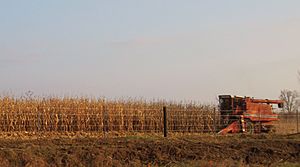Food power facts for kids
Food power is when a country uses its food supply to influence other countries. It's like using food as a tool in international games. A country might offer or hold back food from another country to get them to change their actions. This idea became important after OPEC (a group of oil-producing countries) used oil to influence politics. Food has a big impact on what nations do. When a country faces food power, it usually tries to get food for its people.
Food power is a key part of how countries deal with food. It's used in situations like embargoes (when trade is stopped), jobs, and general food policies. For a country to use food power well, it needs to have a lot of food, control where it goes, have many buyers, and be able to act on its own. The four main countries that export enough farm products to use food power are the United States, Canada, Australia, and New Zealand. In some African countries, food power has been used in smaller ways, like during wars, where groups might stop food from reaching their own people.
Contents
Countries with Food Power
There are four main countries that export enough farm products to potentially use food power: the United States, Canada, Australia, and New Zealand. Countries that need to buy food from these nations might worry about not getting enough if supplies are held back. But usually, food-exporting countries don't stop sending food. This is because farmers in these countries want to keep selling their products.
How Food Affects Politics
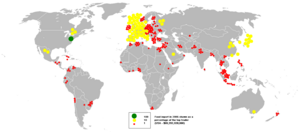
Food politics is all about how food is grown, controlled, and shared. This includes rules, checks, and how food gets to stores. Things like what's right or wrong, culture, health, and the environment can all affect food politics. Food power is a big part of this.
In 1974, Earl Butz, who was in charge of farming for the United States, said, "Food is a weapon." This idea came up after OPEC used oil to influence other countries. It made people think that America could use food to achieve its goals.
Sometimes, a country that buys food can also use food power. They might refuse to buy food unless the selling country agrees to something. This has a similar effect to a seller refusing to export. For example, the U.S. once reduced how much sugar it bought from Cuba. If one buyer is very important to a seller, and the seller doesn't have many other things to sell, the buyer can use this to their advantage.
Food Power and Food Security
Food security means that everyone in a place always has enough food to be healthy and active. Food power is different, but they are often connected. Food power happens when a government or leader takes away this security to get something in return. Many countries use food power to threaten another country's food security. Every country wants its people to have enough food. This need for food can be used as a way to gain power in the world of food politics.
Food Power and Embargoes
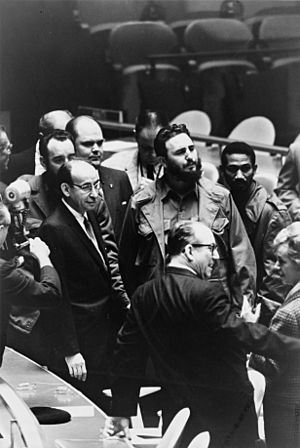
An embargo is when a country or group stops trade with another country. Food power can be used as part of an embargo. Embargoes often fail if they don't include food. For example, in 1914, the Allied Powers started an embargo against Germany. It wasn't very effective until food was added to the list of banned items. Once food was included, the blockade really hurt Germany's economy because they relied on food imports. This forced Germany to take desperate actions, and they eventually lost the war.
In the early 1980s, the United States tried to use food power by stopping grain exports to the Soviet Union. However, the Soviets just bought grain from other places, though it cost them more. Another attempt at food power that didn't work was when the UN Security Council put an embargo on Iraq in 1990.
The United States also has an embargo against Cuba. This embargo is still going on. Many people protest it because it has made life very difficult for the people of Cuba.
How Food Power Works
For food power to be used effectively, certain things need to be true:
- Scarcity: If there's a lot of demand for food but not much supply, food becomes more valuable. This higher value shows how important it is. A country might be willing to make big political deals to get food.
- Supply Concentration: Only a few countries should control most of the food supply. This means there's less competition, and they can set prices or even create a monopoly (where one seller controls everything).
- Demand Dispersion: There should be many buyers who need the food. This allows sellers to make buyers compete against each other, raising prices or adding conditions. This makes food a powerful tool.
- Action Independence: The country selling the food must control its own food production. This might mean the government controls the farms or companies that produce food.
All four of these conditions must be present at the same time for food to become a political tool. Even then, a country might not use it. The decision depends on the situation, the goals, and other ways to achieve those goals.
Using Food as a Political Tool
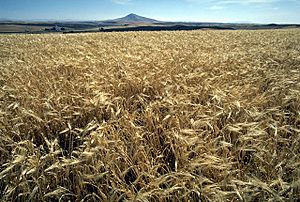
Food can be used as a political tool in several ways. Sometimes, it's used in business deals, like setting prices or delivery times. While this is using food power, it's not for political reasons.
Food can also be used to influence a country's general economic policies, like how it handles money or taxes. The difference here is that the conditions set by the food seller are not directly about the food sale itself, but about the buyer's economy.
A more direct political use is when food is used to influence a country's foreign policy or defense. Many people think it's wrong to use economic things like food for political gain. Examples include stopping trade with certain countries or using food aid to gain votes in the UN.
The most extreme use is when governments no longer see each other as rightful leaders. In this case, food is used not just to influence, but to try and cause the other government to fall or give up.
The United States and Food Power
The United States has long been a leader in many areas, including military and energy. While it was strong in other ways, food power wasn't a main focus. But as some of those other powers have changed, the importance of food has grown. The U.S. is still the biggest producer and exporter of food.
Many countries, especially developing ones and even some rich oil-exporting nations, are starting to have food shortages. They are relying more and more on food imported from the United States. This gives the U.S. more influence. It can expect friendly behavior from countries that buy American food. The U.S. might even have some control over these countries. Even some poorer OPEC countries depend on U.S. wheat. This means the United States could limit its food exports for political reasons, especially during times of food shortage or famine, when countries are most desperate.
The U.S. has often used its economic power to pressure other countries. One way is by holding back food exports. The reasons for this can be to contain countries seen as threats, especially those with different types of government. For example, the U.S. might not give aid to communist countries or those that support certain leaders. Another reason is to protect its own economic interests, like if countries try to take over U.S. companies or start their own economic policies.
However, the U.S. has changed its approach since the 1970s. A law passed in 2000 (the Trade Sanctions Reform and Export Enhancement Act) removed some limits on farming exports to countries like Libya, Sudan, and North Korea. It also gave Congress more power to stop a president from acting alone on these issues.
Food Power in Africa
Food politics in Africa is different from North America or Europe. In Africa, food power is often used on a smaller scale, especially in countries like Sudan. Some people think that famines and food problems in Africa are just due to bad harvests or population growth. But if you look closer, you see that nature isn't the only cause.
Sudan
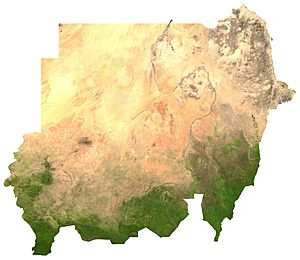
Famines are often explained by two main ideas. The first is that there's simply not enough food available, maybe because of a drought or war. This is a natural cause. The second idea is about whether people can actually get food. In this case, food power plays a role on a small scale. In Sudan, opposing political groups have sometimes used or encouraged famine to gain votes or power.
For example, the famine in Sudan in the 1980s was partly planned. Different powerful groups used it to improve their political and economic positions. Merchants also benefited by hoarding grain and buying animals cheaply when food was scarce. During the 1987 famine, some merchants in western Sudan were criticized for refusing to sell grain at fair prices to needy villages in Darfur. So, the Sudanese famine was another example of food power, where food was used as a political tool, ignoring the needs of the people.
The famine in Sudan in 1998 was a terrible disaster. It was caused mainly by human rights abuses, as well as drought and the slow response from the world. The worst affected area was Bahr El Ghazal in southwestern Sudan, where over 70,000 people died.
See also
 In Spanish: Poder de los alimentos para niños
In Spanish: Poder de los alimentos para niños
- List of countries by real population density based on food growing capacity


